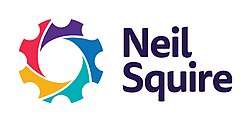Neil Squire Society
Neil Squire Society is a Canadian national not-for-profit organization that empowers Canadians with disabilities through advocacy, computer-based assistive technology, research and development, and various employment programs. It has five locations across Canada.[1]
 Neil Squire logo | |
| Formation | Neil Squire Rehabilitation Society: June 19, 1984
Neil Squire Foundation: January 15, 1985 Neil Squire Society: October 18, 2004 |
|---|---|
| Type | Non-profit organization |
| Legal status | active |
| Headquarters | Burnaby, British Columbia, Canada |
| Location | |
Region served | Canada |
Executive Director | Dr. Gary Birch |
Staff | 73 |
| Website | www |
History
The Neil Squire Society began as a result of Bill Cameron's efforts with his relative Neil Squire. When Neil was paralyzed from the neck down in a car accident in 1980, Bill created a “sip-and-puff” machine to allow Neil to communicate using Morse code. Soon thereafter, Bill and a small group of volunteers began teaching other rehabilitation patients to use computers to enhance their independence. This marked the creation of the Neil Squire Society's first program, Computer Comfort.
After Neil's death in 1984, this group decided to name their new organization in his honour. The group was originally incorporated as the Neil Squire Rehabilitation Society, then the Neil Squire Foundation. The group went through one more name change and is now Neil Squire Society.
Headquartered in Burnaby, British Columbia, Canada, the Neil Squire Society now has offices in Moncton, Fredericton, Ottawa, and Regina.
Programs and services
Programs
The Neil Squire Society provides employment programs, computer tutoring, online services and assistive technology solutions for persons with disabilities.[2]
Services
A for-profit social enterprise, Solutions provides workplace ergonomic and assistive technology solutions for individuals and employers. Clients of this program begin with an assessment in one of the Neil Squire Society's state of the art Assistive Technology for Employment Centre (ATEC) labs where they are matched with and trained on the assistive technology that best suit their needs.[3]
Research and development
One of the major focuses of the Neil Squire Society is the development of technologies that enable persons with disabilities to be fully involved with society. The Research and Development arm of the Society, facilitates the development of these technologies.
The Research and Development Group has been responsible for many advancements in the field of accessibility. Because of these projects, over the last 25 years the R&D Group has built an international reputation for its work in creating technologies and solutions to enable persons with disabilities to achieve their potential.
References
Further reading
- Ellis, Erin (April 13, 2016). "Metro Vancouver non-profit wins $800,000 grant to help disabled use mobile phones". Vancouver Sun. Retrieved June 26, 2016.CS1 maint: ref=harv (link)
- Varney, E. (2013). Disability and Information Technology: A Comparative Study in Media Regulation. Cambridge Disability Law and Policy Series. Cambridge University Press. p. 82. ISBN 978-1-107-06699-1. Retrieved June 26, 2016.CS1 maint: ref=harv (link)